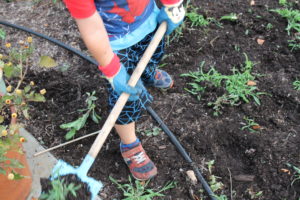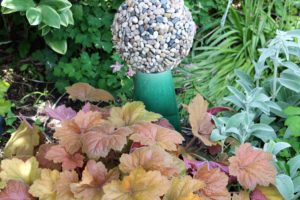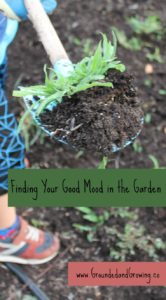More evidence points to measurable health benefits from gardening and experiencing nature.
There’s nothing quite like that joyous first step into the garden after a long winter.
The bright promise of a spring day with the sun warm on your shoulders, birds filling the air with their joyful chirps, bright green shoots popping up in the garden, inhaling the warm familiar scent of that first scoop of soil crumbling in your fingertips…
Non-gardeners probably think that comment about soil is crazy.
But if you’ve ever found an iota of enjoyment in the garden, you’ve probably encountered some great feeling or fantastic smelling soil somewhere along the way. I’ve always thought of it as just part “the Zen of gardening”– the peace and joy that are part of why gardeners love gardening.
Funny how information finds us these days; this winter while randomly scrolling Facebook I saw an article about soil microbes as antidepressants. It turns out that a particular soil bacterium may be influencing all those warm fuzzy feelings about being out in the garden– by changing our brain chemistry. Crazy right?
It’s not as crazy as it sounds.
Immunologists first linked soil bacterium Mycobacterium vaccae to human health while studying vaccines for Mycobacterium tuberculosis, the bacterium that causes tuberculosis (TB). They found people exposed to M. vaccae responded better to the vaccine for M. tuberculosis. Later research showed that M. vaccae was affecting patients’ immune systems in ways that made the M. tuberculosis vaccine more effective.
Some years later oncologist Dr. Mary O’Brien administered M. vaccae to lung cancer patients. The hypothesis was the bacterium might enhance their immune system and help them fight their cancer. She was unable to show that her patients’ lives were lengthened, but her patients reported feeling less pain, less nausea, better emotional health, clearer thinking and more focus.

My son helping to dig out some crabgrass. His latest fashion statement is two different shoes.
How did this tiny bacterium do this? Researchers thought they knew how the bacterium was triggering the immune system, but the effects on mental health reported by Dr. O’Brien’s patients were not expected.
Researcher Dr. Christopher Lowry was intrigued by this unexpected result. He used mice to identify how M. vaccae affected brain function. His results published in Neuroscience in 2007 generated a lot of attention and showed that exposure to M. vaccae stimulated the mice’s immune systems to produce chemicals called cytokines. The cytokines stimulated particular nerves to produce serotonin, a neurotransmitter associated with well-being. Deficiencies in serotonin have been linked to mental health issues such as depression, anxiety, and obsessive-compulsive disorder. There are anti-depressants, such as Prozac that raise levels of serotonin to reduce depression symptoms.
So of course the media jumped on this and proclaimed garden soil the next Prozac.
But that’s only part of the story that has continued to emerge.
Mouse behavior observations showed that those treated with M. vaccae experienced less stress. (If you’re curious, apparently you measure a mouse’s stress by letting him take a swim. Stressed mice don’t swim, they float. Non-stressed mice swim around happily).
Dr. Lowry’s recent research shows that mice exposed to M. vaccae and put in a stressful situation (in the same cage with a larger, more aggressive mouse) exhibit less fear- and anxiety-based behavior than those not exposed to the bacteria.
The scientific conclusion is that the M. vaccae promotes stress resilience in the mice. In practical terms, Dr. Lowry showed he can prevent the mouse equivalent of post-traumatic stress disorder (PTSD). This June he begins a human study of 40 Colorado veterans suffering from PTSD to see how M. vaccae affects their response to stress.

Our “woodland garden” is one of my favorite garden Zen spaces.
Researchers Dr. Dorothy Matthews and Dr. Susan Jenks showed that exposure to M. vaccae produced not only reduced anxiety in mice, but increased their ability to perform cognitive tasks (as measured by learning their way through a maze). Their research may help support movements to increase students’ time spent outside during the school day.
Another interesting aspect of this research is researchers saw less incidence of stress-induced GI tract inflammation in mice exposed to M. vaccae. Dr. Lowry and other researchers look to this as evidence of the importance of the microbiome (all those microorganisms that live in and on us), chronic inflammation (your immune system on high alert for extended periods), and various takes on the hygiene hypothesis (early exposure to various microbes influences immune system development).
The complex web that this research has uncovered makes my inner-nerd girl dance with joy. Nature is amazing isn’t it?!
But the biggest reason this research makes me so excited?
The results to date suggest you don’t need to do anything special to reap the benefits except spend time in nature. That’s it. No special exercises, equipment, classes, or pills.
Next time you’re feeling like life is pulling you everywhere but the garden, this research may help you put gardening back on your priority list. And I don’t mean just the never ending list of gardening “to-dos” that we all have. This research shows evidence pointing to real health benefits from being outside, experiencing the joy and Zen of gardening and nature; it’s not just a bunch woo-woo tree-hugging hippie crap.
You just need to give yourself permission to be out in your backyard– not necessarily doing a darn thing– though getting your hands dirty may speed the process and soothe your soul as well.
If you liked this post, please subscribe to Grounded and Growing today and receive your copy of “15 Tips to Become a '15 Minute Gardener'” so you can spend less time working ON your garden and more time enjoying being IN your garden.! It’s absolutely free. When you join the Grounded and Growing community, you’ll finally take the garden off your “To-Do” list and allow yourself time to enjoy your garden and savor the peace and serenity there. I tell subscribers about new posts as soon as I hit ‘publish’ and send weekly-ish updates on what’s going on in my garden– good, bad AND ugly.

All Rights Reserved. © 2017 Jennifer Schultz Nelson
I was just thinking the other day that gardeners seem to be some of the happiest, most serene people I know–this helps prove it–I need to garden more!
I couldn’t agree more!!
WOW! Thanks for sharing this information. I’ve always noticed that the smell of soil being cultivated improves my mood. Now I have a scientific reason!!!
You’re welcome Jones! I love it when something we all know intuitively gets “proven” by science. I think scientists are just scratching the surface as far as the importance of microbes in human health– which I find exciting as well. But maybe that’s just the science nerd in me. Or the plant lover looking for more excuses to get outside!